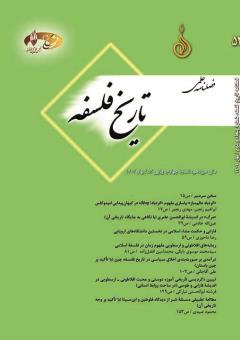فارابی و حکمت مشاء اسلامی در نخستین دانشگاههای اروپایی
محورهای موضوعی : . New findings about philosophical figures and schools of Iran and the world of Islam
1 - دانشیار مؤسسه مطالعات فرهنگی و اجتماعی، تهران، ایران
کلید واژه: دانشگاههای اروپایی, حکمت مشاء, ابنرشدیهای لاتینی, فارابی, ابنسینا,
چکیده مقاله :
فارابی، فیلسوف شهیر ایرانی، یکی از شخصیتهای محوری حکمت مشاء در قلمرو اسلامی است که گسترۀ افکار وی پس از حیاتش، از مرزهای اسلامی در سه قارۀ آسیا، اروپا و آفریقا گذر کرده و اندیشمندان و حوزههای علمی ادیان یهودی و مسیحی و سرزمینهای غیراسلامی را نیز تحت تأثیر قرار داد. از این میان، اندیشههای فارابی و دو شخصیت محوری دیگر این جریان، یعنی ابنسینا و ابنرشد، تأثیری انکارناپذیر بر نهادهای علمی عالی قرون سیزدهم تا پانزدهم میلادی اروپا گذاشتهاند تا آنجا که نمیتوان بدون توجه به این نقش در هویتبخشی به دانشگاههای اولیۀ اروپایی، بویژه دانشگاه پاریس و فرایند تأسیس دانشکدۀ فلسفه در جریان نزاع دو دانشکدۀ الهیات و صناعت، خوانشی مبتنی بر واقعیت از دلایل شکلگیری و توسعۀ دانشگاههای اولیۀ اروپایی بدست داد. این نوشتار بکمک اسناد و گزارشهای معتبر تاریخی، این فرایند اثرگذاری را توضیح خواهد داد. همچنین این خوانش، یکی از مسیرهای انتقال فرهنگ و اندیشۀ فلسفی مسلمانها به کشورهای اروپایی و نحوۀ شکلگیری نهاد دانشگاه در آن دوران را بصورت انضمامی بتصویر میکشد.
Fārābī, the renowned Iranian philosopher, is one of the central figures of Peripatetic philosophy in the world of Islam. The collection of his thoughts travelled beyond Islamic borders to Asian, Europe and Africa posthumously and influenced the scientific fields of Jewish, Christian, and other non-Islamic lands. The thoughts of Fārābī and two other prominent figures of this school of philosophy, Ibn Sīnā and Ibn Rushd, exercised an undeniable impact on the development of the higher scientific centers of Europe of the 13-15 centuries (AD). In fact, without considering their role in the formation of the first European universities, especially the university of Paris and the process of establishing the faculty of philosophy during the conflict between the two faculties of theology and art, one cannot attain a true knowledge of the reasons behind the development and expansion of the first European universities. Relying on valid historical documents and reports, this paper explains this influential process and, at the same time, portrays one of the routes of the transfer of Muslims’ culture and philosophical thoughts to Europe and the quality of the formation of the institution of university during that time.
